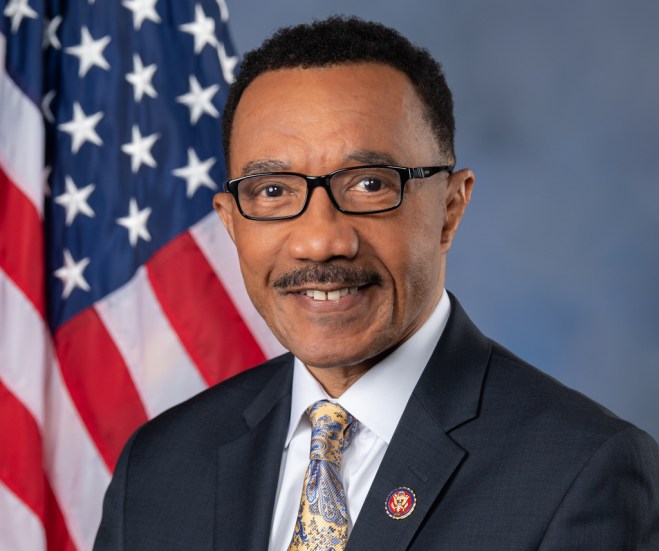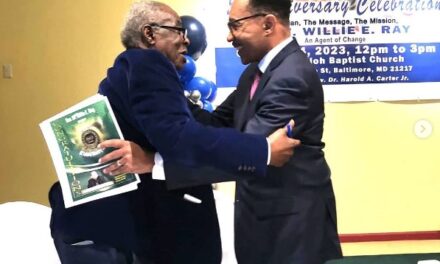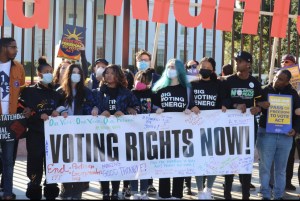
The Infrastructure Bill and Build Back Better Act are recent examples
By Congressman Kweisi Mfume
President Joe Biden has been to Baltimore twice in the last four weeks. This is unusual frequency for presidential visits.
First, he hosted a town hall meeting in our Congressional District which was broadcast live to the nation on television. Then, he came to the Port of Baltimore with the White House press corps to address the nation ahead of the national nightly news broadcasts. In both cases, President Biden came to talk about two pieces of federal legislation the U.S. House of Representatives has led and been laser-focused on recently: (i) the Infrastructure Bill the President signed into law on Monday; and (ii) the Build Back Better Act which the U.S. House is expected to vote on this week.
Billions of federal dollars will flow into Maryland now that the Infrastructure Bill is law. This money will be used to repair roads and bridges; protect the climate; provide clean drinking water; create jobs for all people; bolster transportation safety programs; expand opportunities for minority-owned businesses; make electric vehicles available; expand broadband internet access to all Marylanders; expand the port; and more.
Next on our agenda is the Build Back Better Act (which has not been voted on in the U.S. House of Representatives at the time this column was written but is scheduled to be voted on by week’s end). The Build Back Better Act invests in our human infrastructure, meaning it invests in people and families. This is a direct complement to our work on physical infrastructures such as roads, bridges, pipes, ports, broadband, etc.
I am fighting for passage of the Build Back Better Act and will celebrate its passage because the bill makes landmark investments in children and caregivers; invests in higher education so that higher education is more affordable in communities currently left on the fringes of access to higher education; invests in environmental justice initiatives; and dedicates money towards fighting our housing crisis. Some specific facts about the current version of the Build Back Better Act in the U.S. House include.
Investments for Children and Caregivers
- Provides access to universal pre-k for 138,156 eligible preschoolers in Maryland
- Provides access to affordable and high-quality childcare to 373,811 young children in Maryland, costing eligible parents no more than 7% of their annual household income
- Extends the Enhanced Child Tax Credit for households earning up to $150,000
- Provides an additional 55,000 Maryland students access to healthy and free school meals and another 430,954 kids with resources to access summer food options
- Provides paid leave for workers, including leave to care for sick children
Lowering the Cost of Higher Education
- Increases the maximum Pell grant award by $550M to support over 84,000 students in Maryland who rely on Pell grants for tuition
- Provides Maryland’s HBCUs and minority-serving institutions with access to millions of dollars in grants that improve long-term capacity
- Enhances Maryland’s public community colleges’ workforce programs, sector-based training, and apprenticeships
Addressing America’s Housing Crisis
- Provides 353,000 Maryland renters tenant-based rental assistance
- Provides $65 billion to repair the nation’s public housing
- Provides $25 billion to fund the construction, purchase, or rehabilitation of over 314,000 affordable housing units
- Provides $3.05 billion in Community Development Block Grant funding for affordable housing and community infrastructure upgrades
Other Benefits
- Expands 34,000 uninsured Marylander’s access to healthcare and includes hearing benefits
- Gives the Health and Human Services Secretary the ability to negotiate lower drug prices
- Caps out-of-pocket costs on drug spending in Medicare
- Provides $1 billion in grants to help minority-owned businesses expand their operations
These are unprecedented times. I assure you the U.S. House of Representatives is meeting the times by leading the way on legislation that helps families, individuals, and communities navigate this unprecedented pandemic. Turning the Infrastructure Bill into a law and leading the way on the community centered policies in the Build Back Better Act are just two more examples of the work we are getting done. These policies will help us in the near term and the long term as we continue to make the best possible decisions with the best available information to put this health and economic pandemic behind us.
The opinions on this page are those of the writers and not necessarily those of the AFRO. Send letters to The Afro-American • 145 W. Ostend Street Ste 600, Office #536, Baltimore, MD 21230 or fax to 1-877-570-9297 or e-mail to editor@afro.com
Help us Continue to tell OUR Story and join the AFRO family as a member – subscribers are now members! Join here!
The post The U.S. House of Representatives is hard at work appeared first on AFRO American Newspapers .











